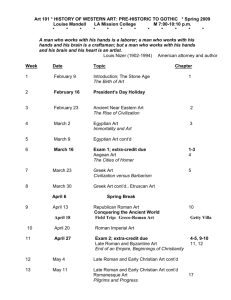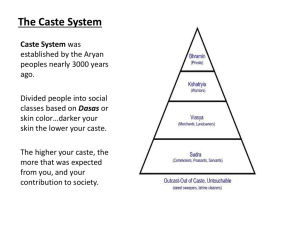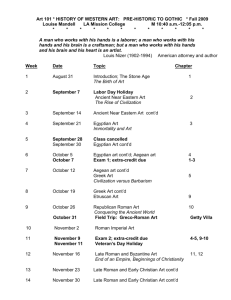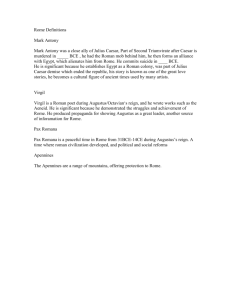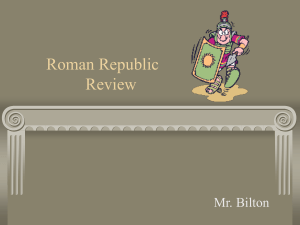World History Mid
advertisement
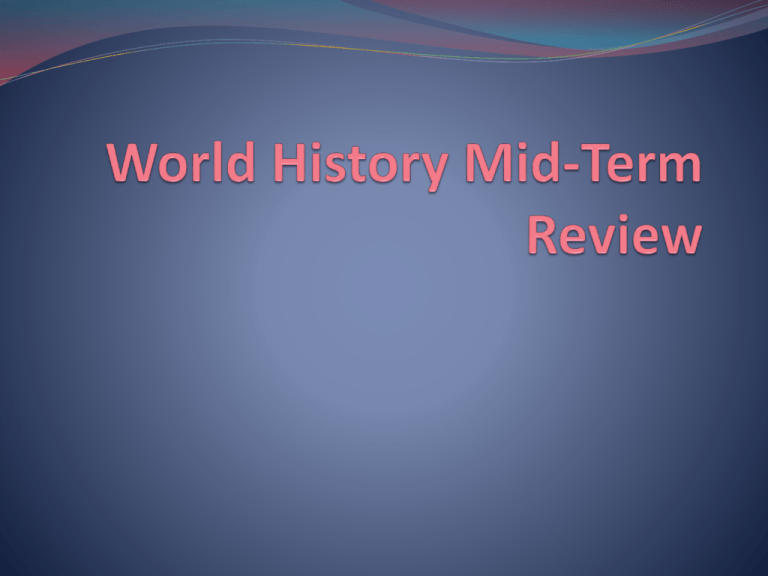
Prehistory, Scribes, Catal Huyuk, Nomads, Paleolithic 1.) These were people who would wander from place to place. 2.) This was known as the old stone age. 3.) This is the time in history before records and writing were kept. 4.) This was the very first known city in the history of the world. 5.) These were the educated people who could read and write in early times. Archeology, Neolithic, Polytheism, Bureaucracy 6.) This is the study of artifacts. 7.) This is how government is broken down and managed through departments run by appointed officials. 8.) This is also known as the New Stone Age. 11.) The belief in many gods is known as 9.) Threats to early man? 10.) Examples of artifacts? Valley of Kings, Hieroglyphics, Cuneiform, Howard Carter, Nebuchadnezzar 12.) He discovered King Tutankhamen’s tomb in the early 1900’s. 13.) This was the form of writing used by the ancient Sumerians. 14.) This Babylonian King built the Hanging Gardens. 15.) The great pharaohs of ancient Egypt are buried here. 16.) This was Egyptian picture writing. Gilgamesh, Hatshepsut, Pharaoh, Ziggurat, Hammurabi 17.) She was the first woman Egyptian pharaoh. 18.) He was a mythical Sumerian hero. 19.) These were pyramid-like structures built in ancient Sumer. 20.) He set up the first code of laws in the history of the world. 21.) This is the name for an Egyptian ruler. Akhenaton, Moses, Khufu, Menes, Tutankhamen 22.) This Egyptian ruler forced people to worship one god, Aton. 23.) This person united Upper and Lower Egypt in 3100 B.C. 24.) He led the Hebrew slaves out of Egypt. 25.) This pharaoh constructed the Great Pyramid in 2600 B.C. 26.) This boy king of Egypt may have been murdered at the age 19. 6-8, Rosetta Stone, 85, 90, Truth 27.) According to early Egyptian writings, if a person’s heart weighed equal or less to the feather of _____________, he/she would have eternal life. 28.) Ramses II would have _______ children and _______ principal wives, in addition to the many lesser wives and concubines. 29.) Ramses II lived to be about _______ years old. 30.) What rights did Egyptian women have? 31.) This made the translation of hieroglyphics possible. Silk Road, Untouchables, Reincarnation, Oracle Bones, Monsoon 32.) These were used by Chinese priests to predict the future. 33.) This is the belief that after one dies, he/ she will come back in the next life as another object, person, or living thing. 34.) This stretched for 4000 miles and connected parts of the Middle East with China for trade purposes. 35.) This is seasonal wind that brings much rain to SE Asia. 36.) These were the lowest in the Hindu caste system, so low they were considered off of the caste. Loess, Huang He, Siddhartha Guatama, Sudras, Vedas, Yin and Yang 37.) This river was also known as the Yellow River from its mud deposits. 38.) These were the Hindu holy books. 39.) This is the balance between good and evil in the universe. 40.) This is yellow muddy soil found in China. 41.) He founded Buddhism. 42.) This is another name for the peasants or laborers in the Hindu Caste System. Confucius, Subcontinent, Shi Huangdi, Rama & Sita, Daoism 43.) This is a large landmass that juts out from a continent. 44.) This was a famous Indian legend about a woman who was kidnapped, then rescued by her husband with the help of some monkeys. 45.) A follower of this would want to be in complete harmony with nature. 46.) He was the Chinese philosopher who the “Analects.” 47.) He was the most well known Qin ruler; he was a violent man who believed in torture and death to those who opposed his rule. Great Wall, Brahmins, Dharma, Karma, Caste System 48.) This/ these were built to prevent foreign invasions from the north. 49.) Hindus believe in this system, which prevents people from improving his/ her present lives. 50.) These priests were the highest in Hindu caste system. 51.) The belief that one’s actions, good or bad, would affect one’s life was known as: 52.) In Hinduism, if one was satisfied with his/her place in life or his/her ___________, he/she would move up in the caste system in the next life. Homer, Nirvana, Acropolis, Monarchy, Marathon, Socrates 53.) The Buddhists’ idea of heaven was known as this. 54.) This Greek poet wrote the Iliad and the Odyssey. 55.) This is a government headed by a king and queen. 56.) This Greek philosopher was convicted of corrupting the youth and sentenced to die. He drank hemlock instead. 57.) The Athenians defeated the Persians at this battle. Afterwards a messenger ran from the battle to Athens to tell of the great victory. 58.) This Greek word means “high city”; Athens has the largest one. Aristotle, Xerxes, Helen, Oligarchy, Troy, Hippocrates 59.) He was Darius’ son who attempted to conquer Greece. 60.) The Trojan War is said to have started after this Trojan queen was kidnapped. 61.) This is a type of government where the power is held by an elite few. 62.) The Greeks went to war with this kingdom during the Trojan War. 63.) He was the famous Greek doctor who created an oath, still taken today! 64.) This student of Plato started a school called the Lyceum. Republic, Darius, Sparta, Achilles, Minoans, India 65.) This Persian ruler started a war with Greece in 492 B.C. 66.) Alexander’s conquest of the world stopped short when he lost many men and nearly his own life here. 67.) He was the famous Greek hero during the Trojan War. 68.) In this city-state, young children were taken away and prepared for the military. 69.) These were the first to settle in ancient Greece. 70.) This is a type of government with elected officials who make decisions. City-states, Democracy, Alexander, Pythagoras, Babylon 71.) In this type of government, power is held by the people. 72.) In 331 B.C., Alexander conquered this Persian capital. 73.) Athens, Sparta, and Olympia are all examples of 74.) This ruler and military general stretched the Greek empire from Macedonia to the outskirts of India. This mathematician came up with the formula to figure out right triangle lengths. Sparta, The Academy, 26.2 Miles 75.) Which city-state won the Peloponnesian War? 76.) Plato started a school for young intellectuals called the 77.) The distance between Marathon and Athens was exactly Nero, Pax Romana, Hannibal, Paul, Jesus 78.) This Roman emperor was blamed with burning Rome in 64 A.D. 79.) He preached a message of love and forgiveness. 80.) He was the Carthaginian general who fought in the 2nd Punic War. 81.) This was a period of time where there were 200 years of Roman Peace. 82.) This person converted to Christianity and is responsible for writing much of the New Testament. Twelve Tables, Circus Maximus, Cassius, Julius Caesar, Scipio 83.) This military general conquered Gaul, returned to Rome with his army, and was later killed by people in the Senate who thought he was too powerful. 84.) He defeated Hannibal in the 2nd Punic War. 85.) He was the mastermind behind the assassination of Caesar. 86.) These were the first Roman laws. 87.) This was the largest Roman arena and could seat 150,000 spectators. Constantine, Patricians, Claudius, Annihilation 88.) Battle where Hannibal killed nearly 70,000 Roman soldiers. 89.) He was the 1st Christian emperor of Rome and legalized Christianity. 90.) He was Nero’s step-father, married his niece, and was poisoned. 91.) These were the rich and upper class in early Rome. Caligula, Antony & Augustus, Marcus Aurelius, Plebeians, Brutus & Cassius & Decimus, Coliseum 92.) These two people tracked down and killed those who were involved in the plot to kill Julius Caesar. 93.) This Roman emperor was thought to have been insane and name his horse consul. 94.) This arena held 50,000 people and would hold mock sea battles. 95.) This Roman emperor wrote “Meditations” and was the last of the 5 good emperors. 96.) Who were involved in the death of Caesar? 97.) The poor and lower class of Rome were called:

